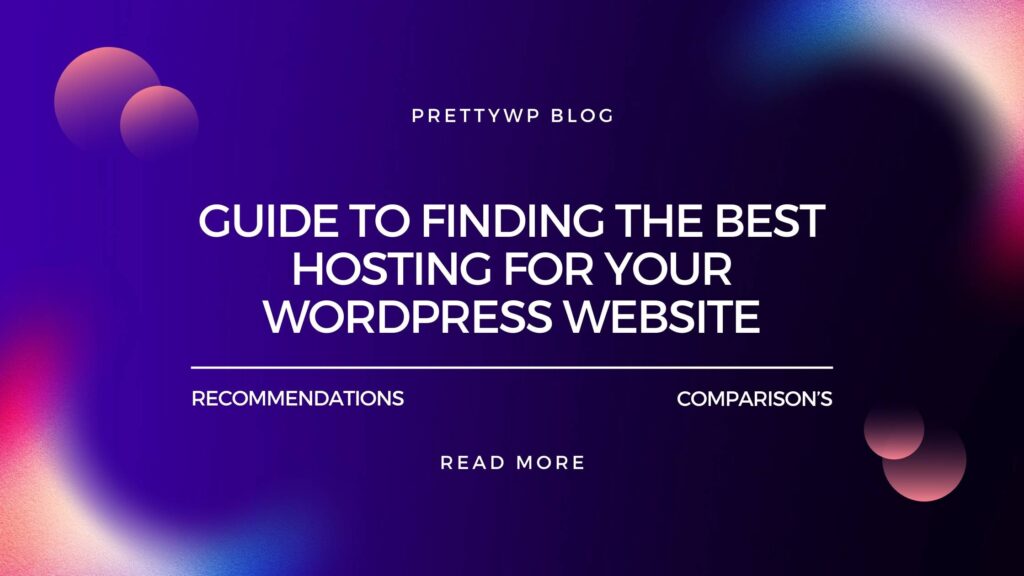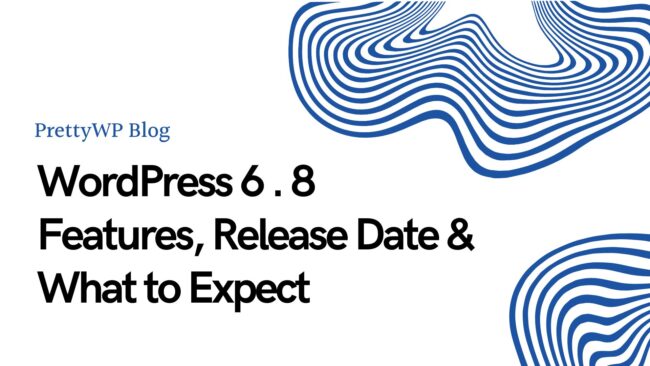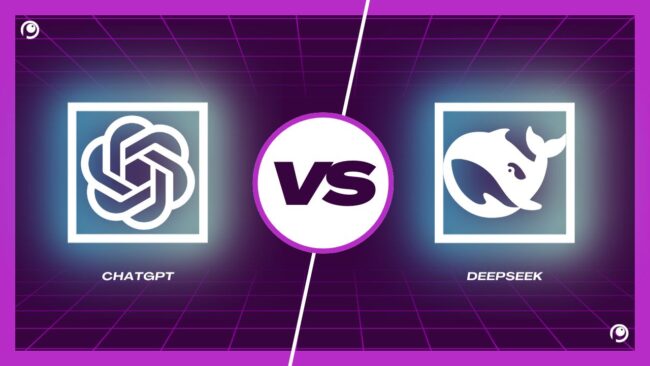Building a successful WordPress website requires careful planning and consideration, and one of the most critical decisions you’ll make is choosing the right hosting service. Whether you are a blogger, business owner, or developer, selecting the appropriate hosting can significantly impact your site’s performance, security, and overall success. This guide will help you understand the key factors to consider, the different types of hosting available, and how to assess your hosting needs. We’ll also provide top recommendations and real-world examples to help you make an informed decision.
Why Choose the Right Hosting for Your WordPress Site?
Selecting the right hosting provider is crucial for your website. Firstly, your website’s speed and uptime depend heavily on the quality of your hosting service. A reliable host ensures that your site loads quickly and remains accessible to visitors at all times, which is important for maintaining user engagement and boosting search engine rankings. Security is another concern; a good hosting service will provide robust measures to protect your site from cyber threats. Furthermore, the right hosting service offers excellent customer support, enabling you to resolve issues promptly and keep your website running smoothly.
Overview of Different Hosting Options
When it comes to WordPress hosting, there are several options available, each with its unique set of advantages and potential drawbacks. Understanding these options will help you make an informed decision based on your specific needs and the scale of your website. Here is a detailed look at the most common types of WordPress hosting:
Shared Hosting
This is the most cost-effective and popular solution and is typically ideal for beginners or small websites. In shared hosting, your site shares server resources with other websites. This means that while the cost is low, performance can be affected by the activity levels of other sites on the same server.
- Pros: Cost-effective, easy to set up, requires minimal technical knowledge.
- Cons: Limited resources, performance can be affected by other websites on the same server, lesser control over server settings.
Shared hosting is best suited for personal blogs, small business websites, and low-traffic websites. Beginners and those with limited budgets can benefit most from this type of hosting.
Managed WordPress Hosting
Managed WordPress hosting is a specialized service that handles all the technical aspects of running a WordPress site. This includes updates, backups, security, and performance optimization. Managed hosting providers often offer additional features such as staging environments, premium support, and enhanced security measures. This type of hosting allows you to focus on content creation and business growth without worrying about the technical details.
- Pros: Optimized for WordPress, automatic updates, robust security features, excellent support, often includes additional tools like staging environments.
- Cons: More expensive than shared hosting, limited control over certain settings, might not be suitable for sites using complex customizations outside of WordPress.
This type of hosting is ideal for business websites, high-traffic blogs, and anyone seeking a hassle-free WordPress experience. It caters to users who prefer to focus on content and growth rather than technical management.
VPS Hosting (Virtual Private Server)
VPS hosting provides more control and resources by partitioning a physical server into multiple virtual servers. This setup offers better performance and stability compared to shared hosting, as your website gets a dedicated portion of the server’s resources.
- Pros: Better performance and stability, more control over the server environment, scalable resources.
- Cons: Requires more technical expertise to manage, higher cost compared to shared hosting, still shares the physical server with other VPS instances.
VPS hosting is suitable for growing websites, e-commerce stores, and medium-sized businesses that need reliable performance and customization options. It is ideal for users who need more control over their server but do not require a dedicated physical server.
Dedicated Hosting/Server: Dedicated hosting gives you an entire server dedicated solely to your website. This option provides maximum performance, security, and customization. With dedicated servers, you have full control over the server environment, which means you can optimize it to meet the specific needs of your site. However, this level of service comes at a higher cost and requires technical expertise to manage effectively.
- Pros: Maximum performance, full control over server settings, highest level of security and reliability.
- Cons: Most expensive option, requires significant technical knowledge to manage, overkill for smaller sites with less traffic.
Dedicated hosting is best suited for large websites with high traffic volumes, companies with stringent security needs, and websites requiring extensive customization. Enterprises and high-traffic e-commerce sites typically benefit most from this type of hosting.
By carefully considering the needs of your website and weighing the pros and cons of each hosting option, you can choose the best solution to ensure optimal performance, security, and scalability as your site grows.
Key Factors to Consider When Choosing a Hosting Plan
Selecting the ideal hosting plan for your WordPress website requires careful consideration of several critical factors to ensure the solution aligns with your unique needs. Below, we provide a detailed examination of these key considerations:
Performance and Speed
The performance and speed of your website are crucial for delivering a superior user experience and achieving higher SEO rankings. When evaluating hosting plans, it’s essential to consider the impact of server resources such as CPU and RAM. These components directly influence how quickly your website can handle requests and serve content to visitors.
Additionally, the location of the server plays a significant role in site speed. Servers closer to your target audience will generally provide faster load times. Incorporating Content Delivery Networks (CDNs) can further enhance performance by caching content at strategic points around the globe, thereby reducing latency and improving access speed for users, regardless of their location.
Ease of Use
The ease of managing your hosting environment can significantly influence your overall experience. A user-friendly control panel is essential for efficiently handling various aspects of your website, such as setting up email accounts, managing databases, and performing backups. These control panels should offer intuitive navigation and tools, ensuring that even users with limited technical expertise can manage their websites effectively. Look for features like one-click WordPress installations, automated updates, and comprehensive database management tools to streamline your website operations.
Security Features
Website security is important and should be a top consideration when choosing a hosting plan. Look for providers that include robust security measures such as SSL certificates, which encrypt data transmitted between your website and its visitors. Firewalls are crucial for blocking unauthorized access and threats, while regular automated backups ensure that your data can be quickly restored in case of loss or corruption.
For WordPress hosting specifically, additional security features are often available. These may include malware scanning and removal, specialized WordPress firewall rules, and protections against common WordPress vulnerabilities. Ensuring your hosting provider has a comprehensive security strategy can safeguard your website from a wide range of threats.
Scalability
As your website grows, so too will your hosting needs. Scalability is a critical factor to consider, encompassing the ability to handle sudden traffic spikes and the options to upgrade resources as required. A scalable hosting plan should allow seamless transitions to higher-tier plans or the ability to add more CPU, RAM, storage, and bandwidth without significant downtime or disruptions.
A hosting provider that supports scalability ensures that your website can adapt to increased demand, whether it’s a seasonal surge in traffic or long-term growth. This flexibility can be crucial for maintaining optimal performance and user satisfaction.
Support and Customer Service
Efficient, reliable, and responsive customer support is vital, particularly when technical issues arise. Hosting providers offer various types of support, including 24/7 live chat, phone support, a ticketing system, and comprehensive knowledge bases.
Opting for a provider with robust customer support ensures that you have access to prompt assistance whenever you need it. Look for hosting services that not only offer multiple support channels but also have a reputation for quick response times and effective solutions.
Cost and Budget
Budget is a significant factor when choosing a hosting plan, but it should be balanced against the value provided. Different hosting types come with varying cost structures, from the affordability of shared hosting to the higher price tags of VPS and dedicated servers.
Consider the long-term costs, including initial rates, renewal prices, and any potential upgrade fees. It’s essential to compare the features and benefits of each plan to ensure you are getting the best value for your investment. Be wary of hidden costs that may arise, such as charges for additional storage, backups, or premium support.
Detailed Comparison of Hosting Types
To make a decision on the best hosting solution for your WordPress website, it is essential to understand the distinctions between various hosting types. This detailed comparison highlights the strengths and potential drawbacks of each hosting type, allowing you to align your choice with your specific needs.
Shared vs. Managed WordPress Hosting
- Performance and Security Differences: Shared hosting often involves multiple websites sharing the same server resources, which can lead to slower performance and lower security due to resource contention and potential vulnerabilities of other sites sharing the server. In detail, Managed WordPress Hosting is specifically optimized for WordPress, offering faster load times, enhanced security configurations tailored to WordPress, including regular updates, automated backups, and malware scanning.
- Ease of Use and Maintenance: Shared hosting typically provides a basic level of service, often requiring users to manage updates, backups, and security measures independently, which can be cumbersome for those without technical expertise. Managed WordPress Hosting, however, takes care of the technical aspects like updates and backups automatically, providing an easy-to-use environment tailored specifically for WordPress sites. This allows users to focus on content creation rather than site maintenance.
VPS vs. Dedicated Hosting
- Performance and Security Differences: VPS hosting leverages virtualization technology to provide a dedicated portion of server resources, ensuring better performance compared to shared hosting but may still be affected by the overall physical server’s load. Dedicated hosting dedicates an entire server to one website, providing unparalleled performance, maximum security, and isolation from other users. This makes dedicated servers ideal for handling high-traffic volumes and complex, resource-intensive applications.
- Resource Allocation and Control: VPS hosting offers a lower-cost solution with allocated resources, but there is still some level of shared resource infrastructure among virtual machines. Meanwhile, dedicated hosting provides full server resources without any competition, offering maximum control over server configurations. This allows for extensive customization according to specific needs, making it suitable for high-traffic websites or applications requiring significant resources and advanced configurations.
Managed WordPress Hosting vs. VPS
- Managed Services and Ease of Use: Managed WordPress Hosting aims to simplify the user experience by handling all technical aspects such as updates, security, and performance optimization. This managed service is ideal for users who prefer to focus solely on their content without worrying about the server infrastructure. VPS hosting requires users to have more technical expertise to manage the server environment, although it comes with the benefit of higher customization compared to shared WordPress hosting.
- Flexibility and Customization Options: Managed WordPress Hosting offers limited flexibility as the environment is specifically configured for WordPress, providing optimal performance within those constraints. VPS hosting, on the other hand, offers significantly more flexibility and customization since users can install and configure any software that the server supports, making it a versatile choice for a variety of use cases beyond just WordPress.
Real-World Examples
1. Small Business Websites
1.1 Example: A local business choosing shared hosting
A small local bakery decided to establish an online presence by setting up a website using shared hosting. This cost-effective solution allowed them to get started quickly without significant investment. They used a shared hosting plan from a reputable provider, which included essential features such as a website builder, email hosting, and customer support.
1.2 Pros and cons experienced
Pros:
- Affordability: The low cost of shared hosting was ideal for a small business with a limited budget.
- Ease of Use: The user-friendly control panel helped them quickly set up and manage their website without technical expertise.
Cons:
- Limited Performance: The website experienced slower load times during peak hours due to resource sharing with other sites.
- Security Risks: Shared environment increased the vulnerability to security breaches caused by other sites on the same server.
2. Growing Blogs
2.1 Example: A blog moving from shared to managed WordPress hosting
A burgeoning travel blog initially used shared hosting but faced several performance issues as their traffic grew. Recognizing the need for better performance and security, they transitioned to managed WordPress hosting. This move provided an optimized environment specifically tailored to WordPress.
2.2 Benefits and improvements noticed
Benefits:
- Improved Performance: Faster load times and smoother browsing experience led to higher user engagement and lower bounce rates.
- Enhanced Security: Regular updates, automated backups, and advanced security measures significantly reduced the risk of malware and vulnerabilities.
Improvements:
- Load Handling: The blog could handle more simultaneous visitors without degradation in performance.
- Maintenance: Reduced the burden of technical management, allowing the blogger to focus on content creation.
3. E-commerce Sites
3.1 Example: An online store upgrading from VPS to dedicated hosting
An online electronics store experiencing rapid growth faced challenges with their VPS hosting, including occasional slowdowns and limited control over resources. To ensure a seamless shopping experience and support future growth, they upgraded to dedicated hosting.
3.2 Performance and scalability outcomes
Performance:
- Maximum Speed: The transition to dedicated hosting resulted in significantly faster page load times, enhancing the user experience.
- Reliability: Improved uptime and stability, critical for minimizing downtime during peak shopping periods.
Scalability:
- Resource Availability: The dedicated server provided ample resources to accommodate increasing traffic and high-demand applications.
- Custom Configuration: Full control over server settings allowed the store to implement advanced customization, improving efficiency and customer satisfaction.
Our Recommendations
Based on our research and experience, here are our top recommendations for the best WordPress hosting providers:
Kinsta
Kinsta offers premium managed WordPress hosting with excellent performance and top-notch customer support. Their infrastructure is built on the Google Cloud Platform, ensuring speed and reliability. In addition to their robust performance, Kinsta provides a user-friendly dashboard, automatic backups, and a staging environment, making it easier for users to manage their websites efficiently.
Cloudways
Cloudways provides a flexible cloud hosting platform with a focus on simplicity and performance. Their pay-as-you-go model and various server options make it a great choice for growing websites. Cloudways also offers a highly intuitive interface, free SSL certificates, and 24/7 expert support to help users optimize their hosting experience, regardless of their level of technical expertise.
WP Engine
WP Engine specializes in managed WordPress hosting, offering robust security features, automatic updates, and daily backups. Their platform is optimized for WordPress, ensuring peak performance. WP Engine also provides a suite of developer tools, advanced caching features, and a global CDN, which together enhance the speed and reliability of WordPress sites, making it ideal for businesses of all sizes.
DigitalOcean
DigitalOcean offers scalable cloud hosting solutions with a developer-friendly environment. Their simple pricing and powerful infrastructure make it a popular choice among tech-savvy users. DigitalOcean’s platform includes a variety of tools and resources, such as one-click applications, floating IPs, and monitoring capabilities, which help developers deploy, manage, and scale applications with ease.
Servebolt
Servebolt delivers high-performance hosting with a focus on speed and scalability. Their custom-built platform ensures fast loading times and excellent support. Servebolt’s hosting solutions are designed to handle high traffic volumes and complex websites, with features like automated scaling, proactive security measures, and detailed analytics, providing users with the performance and reliability needed to succeed online.
Final Thoughts
Choosing the right hosting solution is critical for the success of your business. As we’ve explored, factors such as reliability, speed, scalability, and customer support play crucial roles in determining the best hosting service for your needs. Whether you prioritize robust security features or require high-availability uptime, the hosting provider you select will significantly impact your website’s performance and user experience.
When considering reliability, it’s essential to opt for providers known for their strong uptime guarantees. Downtime can lead to a loss of visitors and potential revenue, so a dependable hosting service is non-negotiable.
Customer support is often overlooked but is a key aspect of a good hosting provider. Choose a provider that offers 24/7 support to swiftly address any issues that may arise. Responsive and knowledgeable support can be a lifesaver in critical situations, ensuring minimal disruption to your online presence.
Key Points Recap:
- Reliability: Opt for providers known for their uptime guarantees to ensure your website remains accessible.
- Speed: Assess the server performance and data centers’ proximity to your target audience for optimal load times.
- Scalability: Ensure the hosting service can grow alongside your business needs without compromising performance.
- Customer Support: Choose a provider that offers 24/7 support to swiftly address any issues and provide peace of mind.
We encourage you to evaluate your specific requirements and choose the hosting option that aligns best with your goals.













